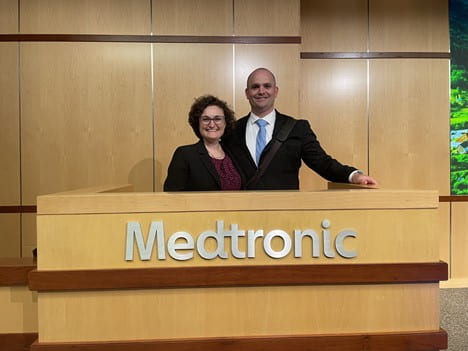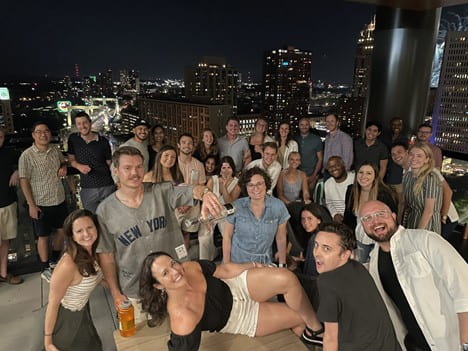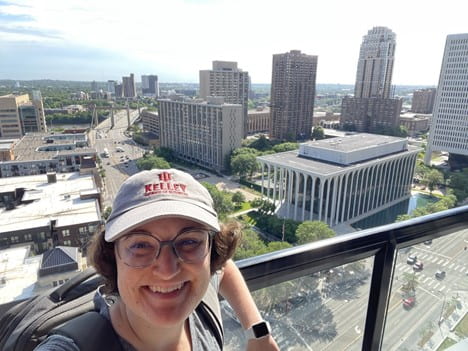Interview by Mani Selvaraj, MBA ’23 with Jim Dyer and Emily Cwyk, MBA ’23

Emily Cwyk and Jim Dyer, MBA 23 at Medtronic in Minneapolis.
What company did you intern with this summer? Which program and/or functional area were you a part of?
EC: I interned at Medtronic in their Patient Monitoring operating unit (OU). I was in the OU’s Business Development and Strategy department, focusing on the strategy side.
JD: I interned with Medtronic. I was part of their leadership development rotational program which enables candidates to gain exposure to all different parts of the company. I was with their strategy team and responsible for identifying high growth opportunities within my business unit.
What project(s) did you work on?
EC: My project was to explore white space opportunities within patient monitoring. This was focused on researching monitoring needs within growing disease states, areas of care, and technologies.
JD: My responsibilities consisted of exploring multiple patient populations and working cross functionally with different stakeholders to identify the best opportunities to enhance access and serve new patient populations.
What was the biggest challenge you had to overcome, and what did you learn from it?
EC: My biggest challenge was when I had to, multiple times, quickly pivot a project. During the eight weeks of my scoping phase, my project’s direction was changed multiple times due to stakeholder input. Because of this, I was very nervous that my weeks of work were going to become useless. To be able to stay on track but fulfill the needs of the stakeholders, I realized that I could use my already collected research as a jumping off point to inform the new project focus. Utilizing the previous research allowed my project to be better supported while also providing the stakeholders with their desired scopes.
JD: The biggest challenge I faced was navigating project-based work in a remote setting which was all brand new to me. As a physical therapist, I had a structured day-to-day between patient care, and managerial responsibilities. To overcome this challenge, I reduced the ambiguous nature of project-based work as early as I could into the internship. I did this by setting up meetings with key stakeholders and developing a framework for how I wanted to approach my final deliverable. This approach enabled me to break the large project into smaller consumable deliverables and have strategic checkpoints with my manager, experts, and peers to continue to reiterate my strategy and drive the project forward. I learned the importance and value of collaboration, not being afraid to ask for help, as well as being confident as an intern amongst experts. It was a great experience!

Emly Cwyk with other MBA Interns
How was your experience networking with different colleagues at your company?
EC: With networking, I found that my best advocates were current participants and alumni of the Leadership Development Rotational Program. My internship was a feeder into this program. These individuals had just been in my shoes and understood some of the obstacles and challenges that I was facing.
I also learned how important it was to meet others through the Employee Resource Groups (ERGs). As Medtronic is a huge company, it can be very easy to keep to one’s own OU and not meet others around the organization. The ERGs help break those barriers by providing opportunities for programs such as for lunch and learns, volunteer projects, and general social events.
JD: Medtronic has a very collaborative culture. As an intern, it was incredibly easy to connect with anyone from any team I was interested in learning more about or reaching out to assist with my summer project. My manager was an excellent mentor. I was also given a peer mentor within my core team as well as a peer mentor from someone further along the process within the leadership rotational program. I was also given access to all current and former alumni of the leadership rotational program. In addition, I was in a cohort of 21 fellow MBA interns that all worked on different projects and were a great resource to connect with. I was able to set up individual time to connect with the chief medical officer as well as the general manager of a multi-billion-dollar portfolio. Not one person at Medtronic refused to meet with me. I couldn’t speak more highly of how collaborative the team was. Medtronic also had many leadership talks in a variety of platforms and settings to give plenty exposure to see the culture and different departments and business units and how they operate.

Emily Cwyk in Minneapolis for Medtronic Internship
Has this experience changed your overall career goals? Did you identify any skills that you would like to develop as you return for the second year of the MBA program?
EC: This internship confirmed my career goals. As a significant career switcher, I was nervous if medtech was the best fit for me. I did not come from a science background but am passionate about healthcare and bettering a patient’s life.
I am interested in strategy but was not aware of how much finance was involved. After learning this, I decided to pursue a finance minor during my second year. While finance is not my passion or one of my strengths, I know that taking these classes will help in my decision-making when I enter my full-time position.
JD: The experience definitely opened my eyes to how many amazing opportunities exist and the importance of having a diverse skill set. I would like to get more exposure to data analytics or financial modeling courses to further broaden my current skill set and enhance my ability to collaborate cross functionally with more teams. While the roles I am interested in pursuing aren’t necessarily heavy in these areas, being able to speak the language is a great asset and enhances credibility when working with different stakeholders.
Are there any other suggestions you would give to future students that are about to begin their summer internship?
EC: Here are my three pieces of advice when starting an MBA internship program:
- Get to know your fellow inters. You will rely on them for everything from navigating the organization to presentation practice and feedback to general socialization.
- Speak up. Whether you have a question or want to suggest a different path for your project, work on building the confidence to speak up to your team or manager.
- Learn if the organization is the right fit for you. This experience is a great chance to learn if you want to pursue a full-time offer with your organization. You are testing to see if this company is the right fit for you just as they are seeing if you are the right fit for them. Become familiar with their leadership style, opportunities for growth and education, and cultural norms. By speaking with colleagues or simply reading the mass HR and communication team emails, you can learn a lot about an organization’s true values and culture.
JD: Have fun!! Enjoy the experience and take advantage of the resources at your disposal. It is equally as important for you to learn about the company and culture as it is for the company to learn about you. If you are having a great experience, that is awesome! Soak up as much as you can and connect with as many people as possible and maximize the limited time you have there. If you are having a challenging or difficult experience during your internship, prioritize what skills you are trying to develop and attempt to maximize the experience and do not be afraid to reach out to classmates, or any of the resources available at IU to make the most of it.
Leave a Reply